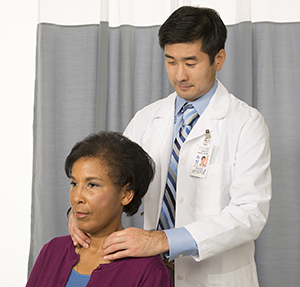Diagnosing a Thyroid Problem
Your healthcare provider thinks you may have a thyroid problem. A thyroid problem can be easy to diagnose in many cases. Your provider is likely to ask about your health history, give you a physical exam, and have you take blood tests. You may also need other tests. Based on the results, your provider may refer you to a hormone specialist (endocrinologist) or a surgeon.
Health history
Your healthcare provider will ask about your health history. Tell them if you:
-
Have had changes in body temperature, heartbeat, weight, or energy level
-
Are taking any medicines or supplements
-
Have ever had thyroid surgery
-
Have a family history of thyroid problems
-
Are pregnant or plan to become pregnant
-
Have ever been treated with radiation to the head or neck
Physical exam
After the health history, your healthcare provider will examine you. They will feel your neck to check your thyroid gland for changes in size or shape. Your provider may also look for changes in heart rate, reflexes, muscle strength, or skin texture.

Blood tests
Your healthcare provider will order blood tests. They may include:
-
TSH test. This shows how much thyroid stimulating hormone (TSH) is being made by the pituitary gland. This test can show if your thyroid is normal, overactive (hyperthyroidism), or underactive (hypothyroidism).
-
T3 and T4 tests. These show the levels of T3 and T4 thyroid hormones in the blood. This test can help diagnose hyperthyroidism or hypothyroidism.
Other tests
Based on the results of your exam and blood tests, you may have other tests. They may include:
-
Thyroid antibody tests. These are blood tests that look for problems with the immune system. These tests are most often to look for underactive or overactive thyroid.
-
Ultrasound. This test uses sound waves to make an image showing the size and shape of the thyroid gland. It is most often used to check for a lump in the thyroid (nodule) or enlarged thyroid (goiter).
-
Radioactive iodine uptake test. This test measures how much iodine the thyroid gland takes in. It is most often done to check for overactive thyroid.
-
Thyroid scan. This is an imaging test that can show if part of the thyroid gland is making too much thyroid hormone. It is most often used to check for overactive thyroid. Or it's used to assess lumps or nodules in your thyroid.
Fine needle aspiration (FNA)
If you have a nodule, you may have a fine needle aspiration done. This is a type of biopsy. A biopsy is a procedure to remove a small sample of tissue. FNA is the best test to find out if thyroid cells are cancer. The healthcare provider uses a needle to take cells from the thyroid. The cells are then looked at under a microscope. If the provider thinks you may have cancer, other tests may also be done. Other testing may help find out the type of cancer. Risks and complications of FNA are rare. But they include mild pain, bleeding, and skin infection.
Online Medical Reviewer:
Raymond Kent Turley BSN MSN RN
Online Medical Reviewer:
Rita Sather RN
Online Medical Reviewer:
Robert Hurd MD
Date Last Reviewed:
3/1/2022
© 2000-2024 The StayWell Company, LLC. All rights reserved. This information is not intended as a substitute for professional medical care. Always follow your healthcare professional's instructions.